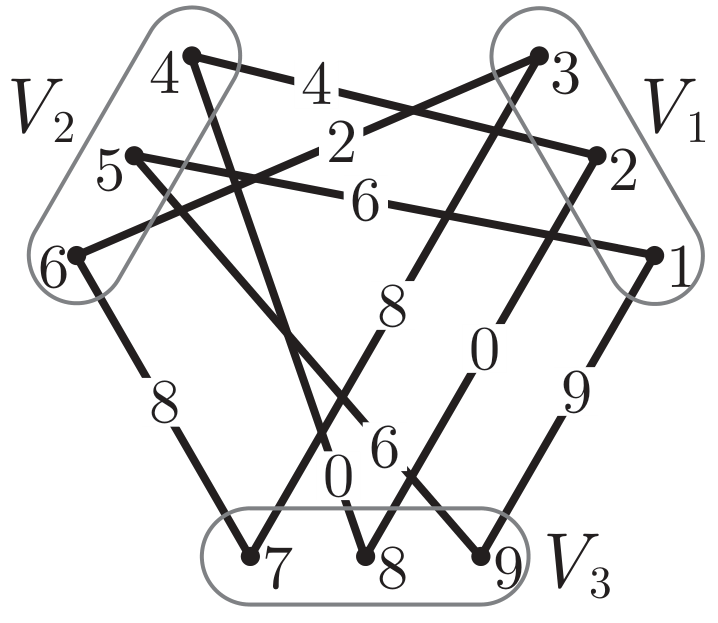This project implements Boštjan Gabrovšek's Multiple Hungarian Methods for solving the
Formally, we seek a
where
This repository provides the implementation of 6 algorithms proposed by Gabrovšek for solving this problem,
which is decomposed into small binary sub-problems and tackled with using the Hungarian procedure.
While this means we can generalize for an arbitrary number
For more technical details, please refer to the paper or contact the authors, not me 😂.
I implemented this code for testing an idea in another project. After that, I decided to publish the code so that someone facing a similar problem can use. Further maintenance or performance tuning might be limited, but all contribution is welcome.
- Python 3.7+
numpyscipyorlaporlapjvorlapsolverormunkres(depends on the backend to be used for solving Linear Assignment Problem)
Simply run the following command:
pip install kap
This is currently a pure Python project, but we may add Cython/C++ extension in the future.
For convenience, we provide kap.linear_assignment as a wrapper around backend functions.
The available backends are:
scipy:scipy.optimize.linear_sum_assignment's documentationlap: https://github.com/gatagat/laplapjv: https://github.com/src-d/lapjvlapsolver: https://github.com/cheind/py-lapsolvermunkres: https://github.com/bmc/munkres
Note that we currently do NOT support sparse matrix. For a benchmark, please head to https://github.com/berhane/LAP-solvers.
The interface is unified as kap.linear_assignment returns a namedtuple of matches,
matching_costs of matched edges, and optionally a list of free(or unmatched) vertices if called with
return_free=True.
import numpy as np
from kap import linear_assignment
cost = np.array([
[9, 6, 4],
[4, 4, 6],
[3, 9, 2]
])
matching_result = linear_assignment(cost, return_free=True, backend="lap")
print("Result:", matching_result)
# Result: AssignmentResult(matches=array([[0, 2],
# [1, 1],
# [2, 0]], dtype=int64), matching_costs=array([4, 4, 3]), free=[])
print("Total cost:", sum(matching_result.matching_costs))
# Total cost: 11kap.k_assignment is the equivalence for
-
cost_matrices: Sequence of$n (n - 1) / 2$ 2D cost matrices of pairwise matching costs between$n$ partites (might not be able to be represented as a 3Dnp.ndarraysince partites can have different number of vertices) ordered as initertools.combination(n, 2). For example,$[C_{01}, C_{02}, C_{03}, C_{12}, C_{13}, C_{23}]$ . -
algo: This should be one of the six proposed algorithms, namely"Am", "Bm", "Cm", "Dm", "Em", "Fm".$\text{C}_m$ is set to be the default as it usually performs as good as random approaches while having a deterministic behavior.
It's return type shares the same structure as that of kap.linear_assignment but with some small differences:
matches: Each element is the list of indices of matched vertices. For example,[(0, 0), (1, 1), (2, 0)]indicates that node 0 of partite 0, node 1 of partite 1, and node 0 of partite 3 are matched together. Note that it is NOT necessary for a match to contain at least one vertex from each partite (incomplete graph).matching_costs: Each element is the sum of pairwise costs of all edges formed by the matched vertices.
The following code reproduce the example described in the paper.
import numpy as np
from kap import k_assignment
costs = [
np.array([ # (0, 1)
[9, 6, 4],
[4, 4, 6],
[3, 9, 2]
]),
np.array([ # (0, 2)
[8, 2, 9],
[5, 0, 4],
[8, 7, 4]
]),
np.array([ # (1, 2)
[4, 0, 9],
[9, 9, 6],
[8, 9, 5]
]),
]
matching_result = k_assignment(costs, algo="Em", return_free=True, backend="lap")
print("Result:", matching_result)
# Result: AssignmentResult(matches=[[(0, 0), (1, 1), (2, 0)], [(0, 1), (1, 0), (2, 1)], [(0, 2), (1, 2), (2, 2)]], matching_costs=[23, 4, 11], free=[])
print("Total cost:", sum(matching_result.matching_costs))
# Total cost: 38These code blocks are extracted from examples.
@software{inspiros_2024_10449791,
author = {Hoang-Nhat Tran},
title = {inspiros/kap: v0.2.1},
month = jan,
year = 2024,
publisher = {Zenodo},
version = {v0.2.1},
doi = {10.5281/zenodo.10449791},
url = {https://doi.org/10.5281/zenodo.10449791}
}MIT licensed. See LICENSE.txt.



